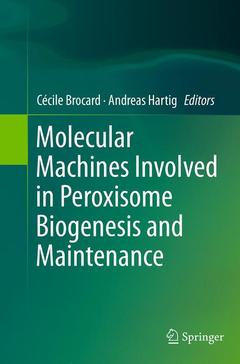Molecular Machines Involved in Peroxisome Biogenesis and Maintenance, Softcover reprint of the original 1st ed. 2014
Coordonnateurs : Brocard Cecile, Hartig Andreas

Cecile Brocard received her PhD in Biochemistry at the University of Vienna, Austria in 1998. She was CIHR post Doctoral fellow at the University of Western Ontario, Medical Sciences, Canada and at the University of Vienna, Austria, where she also was a Guest Professor from 2006 to 2007. In 2007 she became independent research group leader and Elisa Richter Fellow at the Max-F. Perutz Laboratories in Vienna. Since 2012 Cecile has been Head of research in the start up company Tissue Med Biosciences, in Krems an der Donau, Austria.
Andreas Hartig has a PhD in Biochemistry. He was Fogarty Fellow in the Laboratory of Molecular Biology, NINCDS, NIH, Bethesda, USA and Postdoctoral fellow at the Waksman Institute of Microbiology, Rutgers University, in New Jersey and at the Department of Genetics, University of Washington, Seattle, USA. He was research Assistant at the Institute of Biochemistry, University of Vienna, Austria and became Associate Professor in Biochemistry in 1993 where he still works today.
Provides a comprehensive, well structured state-of-the-art overview on various aspects of peroxisomes cell biology and research
A separate part is dedicated to modern technologies such as bioinformatics, proteomics and imaging tools
Model organisms to study peroxisome biogenesis ranging from plants to mammals are presented
The molecular basis of main peroxisome related disorders are described
Includes supplementary material: sn.pub/extras
Date de parution : 09-2016
Ouvrage de 543 p.
15.5x23.5 cm
Disponible chez l'éditeur (délai d'approvisionnement : 15 jours).
Prix indicatif 158,24 €
Ajouter au panierDate de parution : 08-2014
Ouvrage de 543 p.
15.5x23.5 cm
Disponible chez l'éditeur (délai d'approvisionnement : 15 jours).
Prix indicatif 158,24 €
Ajouter au panier


